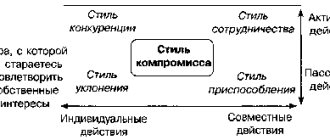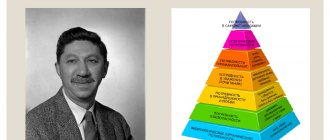We considered it necessary to devote the final lesson of our training on conflict management to the topic of intrapersonal conflict. We decided to do this for the reason that intrapersonal conflict is not only one of the most complex psychological phenomena, but also affects the inner world of a person.
In previous lessons we talked about what ways there are to influence conflicts between people, today you will learn about how a person should behave if he has a conflict with himself.
It’s worth starting with a definition of what intrapersonal conflict is.
What is intrapersonal conflict?
Intrapersonal conflict is an aggravated negative experience caused by a protracted confrontation between various structures of a person’s inner world, reflecting his contradictory connections with the outside world and preventing decision-making. Also, intrapersonal conflict is characterized by the fact that it overcomes any person, and overcomes him systematically.
Intrapersonal conflict can be either constructive or destructive. In the first case, it is an integral part of personal development, and in the second, it represents a danger to a person, because causes stress and difficult experiences, and in some cases even suicide. It is for this reason that any person should know what intrapersonal conflict is, how to define it, and also be able to resolve it.
To recognize intrapersonal conflict, it is necessary to learn to identify its main indicators (symptoms), which can manifest themselves in various areas of personal manifestation.
Ways to deal with conflict
In order to permanently resolve psychological contradictions, it is necessary to approach this problem with all seriousness, make every effort and fully concentrate on it. Recovery takes place in five stages:
- It is worth recognizing the presence of a disorder; acceptance is an important stage of the struggle.
- It is necessary to conduct a deep analysis and identify all the reasons. Break everything down point by point.
- It is necessary to work through every problem that has become a source of development of confrontation. A person must make the right decision and decide on the choice of option: act by listening to reason or feelings. It is extremely difficult to choose on your own; you should contact a professional psychologist.
- Deal with anxious thoughts, free your head from negative thinking, and allow positivity to enter your brain.
- Work on your attitudes.
Take care of your nervous system, all problems disappear over time and become unimportant.
How does personality conflict manifest itself?
Psychological science identifies four main types of indicators of intrapersonal conflict. They relate to the emotional sphere, cognitive sphere, behavioral sphere, and the fourth type is integral indicators:
- Emotional sphere. In the emotional sphere, intrapersonal conflict manifests itself through serious negative experiences and psycho-emotional stress.
EXAMPLE: Depression, stress, apathy, loss of interest in life, etc.
- Cognitive sphere. In the cognitive sphere, intrapersonal conflict manifests itself through disturbances in a person’s perception of himself.
EXAMPLE: Decreased self-esteem, difficulties in choosing and making decisions, doubts about one’s motives, aspirations and principles, inconsistency of one’s own image, etc.
- Behavioral area. In the behavioral sphere, intrapersonal conflict manifests itself through negative changes in human behavior.
EXAMPLE: Negative background of communication, decreased productivity and quality of activity, dissatisfaction with one’s own activities, etc.
- Integral indicators. Complex disorders in the human psyche.
EXAMPLE: Increased emotional and psychological stress, disturbances in the adaptation mechanism, long-term disturbances in a person’s ability to adapt to circumstances, etc.
But, in addition to the fact that intrapersonal conflict can manifest itself in different areas (and even in several at once), it itself is also divided into several types, which significantly complicate both its definition and the development of ways to resolve it. Let's look at them in more detail.
Types of intrapersonal conflict
Before moving directly to the consideration of the main types of intrapersonal conflict, it should be noted that in general most theoretical concepts present several varieties. For example, psychoanalysis examines conflicts between a person's drives and social norms established in society, as well as between a person's needs. And interactionism analyzes mainly role factors. However, in real life the matter is not limited to these approaches alone.
In reality, the situation is such that in life there is a huge number of intrapersonal conflicts. Therefore, in order to bring their entire typology to a single denominator, it is necessary to find some kind of foundation that can serve as a center around which a system of intrapersonal conflicts can be built. And such a center is the value-motivational sphere of the individual, because it is with it that a person’s internal conflict is connected and it is it that is capable of sufficiently reflecting all kinds of relationships and connections of a person with the surrounding reality.
Taking this as the main postulate, we can identify several basic structures of a person’s inner world that come into conflict:
| 1 | Self-esteem, in other words, a person’s value to himself, a person’s assessment of his potential and place among the people around him. |
| 2 | Values that embody social norms. |
| 3 | Motives that reflect the orientation of the individual and all kinds of aspirations (drives, desires, interests, needs, etc.) |
It is depending on which parties within a person’s personality come into conflict that six main types of intrapersonal conflict can be distinguished: adaptation, role, moral, motivational, conflict of unfulfilled desire and conflict of inadequate self-esteem.
Adaptation conflict
An adaptation conflict is understood as both an imbalance between a person and the surrounding reality, and a disruption in the process of professional or social adaptation. Such a conflict arises between a person’s capabilities and the various demands placed on him by reality (psychological, physical, professional). This discrepancy can manifest itself either as a temporary lack of readiness or as a complete inability to meet the requirements.
EXAMPLE: Failure of an employee of an organization to properly perform his or her duties; the recruit's inability to adapt to the new regime in the army; inability to bear physical stress when climbing to the top of a mountain, etc.
Role conflict
Role conflict represents both the inability of a person to simultaneously implement several roles, and a different understanding of the requirements that a person himself places on fulfilling a specific role.
EXAMPLE: A woman may experience behavioral difficulties while being both the mother of her son and his teacher at school; a police officer may be “torn” between fulfilling his duty and being friendly towards his comrade if he suddenly needs to detain him, etc.
Moral conflict
Moral conflict is the conflict between duty and desire, personal affection and moral principles.
EXAMPLE: A man may feel an internal conflict, being a husband, but having the opportunity to start a relationship with a woman for whom he feels sympathy and attraction; a person can experience an internal conflict if he finds himself in a situation in which he needs to take actions that are at odds with his principles, for example, a supporter of peace and pacifism needs to stand up for himself or protect a loved one using harsh methods.
Motivational conflict
Motivational conflict is one of the most common intrapersonal conflicts and can be expressed in the struggle of a person’s unconscious aspirations, the desire to possess and security considerations, and the clash of various motives.
EXAMPLE: A guy may have difficulty choosing between meeting old friends and going out with his girlfriend; a young person may want to take up boxing, but is afraid of being hurt, etc.
Conflict of unfulfilled desire
Along with the conflict of unfulfilled desire, an inferiority complex is also considered. This type of conflict manifests itself in the confrontation between desires and reality, which blocks their satisfaction.
EXAMPLE: A person may want to be like his idol, but in reality he is completely different; a person may want to live richly, but the actual state of affairs is different, etc.
Conflict of inadequate self-esteem
The conflict of inadequate self-esteem is a confrontation between a person’s claims and his real potential.
EXAMPLE: Low or high self-esteem; the desire to become better in order to achieve more and the desire to leave everything as it is, so as not to leave the “comfort zone”, etc.
In addition to other types, there is also a neurotic conflict, which is the result of an “ordinary” intrapersonal conflict that persists for a long time.
As is easy to see, the basis of any type of intrapersonal conflict is precisely the subjective experiences of a person, because they cause the suffering he experiences. And the issue of experiences, based on this, should be given special attention.
The basis of intrapersonal conflict is experience
The field of action of intrapersonal conflicts is any internal experiences of a person: variability, complexity of desires and aspirations, ambiguity of personality, awareness of the impossibility of realizing one’s own potential, fluctuations in self-esteem, etc. However, not a single intrapersonal conflict can arise without the influence of the surrounding reality on a person’s personality, i.e. it is simply not capable of arising simply due to any internal factors. And, taking into account the nature of the contradictions underlying a person’s internal conflict, intrapersonal conflicts can be divided into two subgroups:
- Intrapersonal conflicts that arise due to a person’s internal contradictions, reflecting his subjective attitude to the world around him.
EXAMPLE: This includes the conflicts of inadequate self-esteem and motivational conflicts discussed above.
- Intrapersonal conflicts that are the result of the transition of objective contradictions external to the individual into his inner world.
EXAMPLE: Such conflicts include adaptation, moral and other conflicts.
Well-known researchers of intrapersonal conflicts Elena Andreevna Donchenko and Tatyana Mikhailovna Titarenko identify, among other things, three levels of development of psychological contradictions:
- The inability to implement planned plans and programs and perform one’s vital functions until the contradiction is resolved.
- Imbalance, difficulty and complication of the main activity, projection of psychological discomfort onto the external components of life: communication with others, doing work, etc.
- Psychological balance of a person’s inner world.
At any of these levels, contradictions can be eliminated, and for an intrapersonal conflict to arise, the situation must correspond to certain personal and situational conditions.
Personal conditions include:
- A person’s ability for self-reflection and introspection, a complexly organized and developing cognitive structure.
- High level of development of values and feelings.
- A developed and complex hierarchy of motives and needs.
- A complex inner world and the increased significance of this complexity.
Situational conditions that activate intrapersonal conflict are, in turn, divided into external and internal:
| 1 | The essence of external conditions is that a person cannot satisfy his deepest motives and relationships, or the process of their satisfaction is under threat: the satisfaction of some motives becomes the reason for the emergence of new ones; On the way to satisfying motives, obstacles arise due to man’s struggle with his nature; restrictions on various motives are imposed by social norms. |
| 2 | Internal conditions are a consequence of external ones. The meaning of internal conditions lies in the contradictions between various aspects of the personality that have approximately equal importance. A person must be aware of the conflict nature of the situation and understand that he cannot influence it, which results in an acute experience of a situation of difficult choice. |
It is important to say that a person’s experience of intrapersonal conflict is different from any other experience. It is characterized by the presence of psycho-emotional tension, as well as such phenomena as awareness of the complexity of the situation, the presence of difficult choices, struggle and doubt. The experience of intrapersonal conflict reflects the restructuring of a person’s entire value-motivational system.
Forms of manifestation
Internal conflict can manifest itself in the following forms:
- neurasthenia : depression, deterioration in performance, headaches, sleep problems, and so on,
- euphoria : indicative cheerful mood, tears replacing laughter, joy for no reason,
- regression : primitivism in behavior, avoidance of responsibility,
- projection : negativism towards others, their constant criticism and assessments,
- nomadism : desire for change in various areas of life,
- rationalism : attempts to justify, “whitewash” one’s actions.
How internal conflict leads to illness:
How to avoid conflicts in the family? Recommendations from experts will help you!
Peer review task
You have just learned about the types of intrapersonal conflict and its characteristics. Now we propose to apply the acquired knowledge in practice.
Just below you will find a video that presents three examples of intrapersonal conflict. Your task is to watch this video and give a brief description of each example, based on the information you just learned.
This is a peer review assignment, so you will need to check 2 other people's work first and then upload yours. When checking other people's work, you need to evaluate how correctly, in your opinion, the type of conflict is defined and how deeply the analysis is carried out.
Statistics Full screen
Most likely, you were able to identify relatively accurately what types of internal conflict are presented in the video. However, another important feature of intrapersonal conflict is that it can be characterized by both positive and negative consequences, i.e. the conflict itself can be constructive or destructive.
see also
- Emotional conflict
- intrapersonal conflict
- Emotional stress
- Conflict
Do you like intrapersonal conflict? or do you have any useful tips and additions? Write to other readers below. I hope that now you understand what intrapersonal conflict is and why all this is needed, and if you don’t understand, or if you have any comments, then feel free to write or ask in the comments, I will be happy to answer. In order to gain a deeper understanding, I strongly recommend studying all the information from the General Psychology category.
Constructive intrapersonal conflict
Constructive, i.e. An optimal or productive intrapersonal conflict is a conflict in which the development of the conflicting parties occurs, and the personal costs of resolving it are minimal. Such a conflict is a mechanism for harmonizing personality, because in the process of resolving it, a person realizes himself as an individual.
One of the characteristics of personality is that it correlates with each other certain life relationships, which give rise to internal struggle. In some cases, this struggle can occur in forms that do not appear outwardly and do not have a destructive effect on a person’s personality. If a person is harmonious, this does not mean that he is not subject to internal struggle. Moreover, this struggle can become the basis of a person’s entire appearance.
Constructive internal conflict can strengthen character, form determination and psychological stability, independence; is able to establish a clear direction for the individual, create new character traits, promote adequate self-esteem, personal growth and self-knowledge.
EXAMPLE: Fighting bad habits; development of willpower; working on yourself, despite reluctance and laziness; the ability to put one’s own desires in the background for the sake of the good of another person or even one’s own, etc.
Destructive intrapersonal conflict
Destructive intrapersonal conflict, i.e. destroying personal structures is a conflict that aggravates the duality of personality. It can develop into a severe life crisis and develop neurotic reactions.
A long-term destructive conflict can negatively affect a person’s activity, contribute to the inhibition of personal development, create uncertainty and psychological instability, and inability to achieve goals. In a deeper sense, such a conflict can cause a person to not develop the qualities that a mature personality should possess. If destructive intrapersonal conflict arises frequently, this can lead to the formation of an inferiority complex, loss of self-confidence and strength, or even loss of meaning in life.
EXAMPLE: Long-term dissatisfaction with the quality of one’s life; the child’s conviction that he is inferior, not like everyone else; a requirement from a person to behave differently in the same situation, etc.
But, despite the fact that intrapersonal conflicts can be constructive, destructive ones are much more common in real life. And if the former can be safely called even desirable, then the latter should be learned to recognize and prevent.
"I-concept"
Representatives of the humanistic school viewed the theory of intrapersonal conflict differently. The fundamental component of the personality structure, Carl Rogers believes, is the “Self-concept” - the individual’s idea of himself, the image of his own “I”, formed in the process of interaction with the environment. Self-regulation of human behavior occurs on the basis of the “I-concept”.
But the “I-concept” often does not coincide with the idea of the ideal “I”. There may be a mismatch between them. This dissonance between the “I-concept”, on the one hand, and the ideal “I”, on the other, acts as an intrapersonal conflict, which can lead to severe mental illness.
Prevention of intrapersonal conflicts
Our life is structured in such a way that there is always a high probability of circumstances arising that can lead to the destruction of the harmonious process of development and a negative impact on the inner world. And it’s very bad if we are not prepared for such situations. Every effort must be made to avoid the development of destructive intrapersonal conflicts, and if they appear, then resolve them as quickly as possible. Having information about how and why internal conflicts arise, it is possible to determine the conditions necessary to prevent them.
To prevent the occurrence of intrapersonal conflict, you need to follow the following recommendations in your life :
| ✔ | In order to maintain the integrity of his inner world, a person must learn, first of all, to perceive life’s difficulties as an integral part of his life, because This approach can encourage him to work on himself and activate his creative potential. |
| ✔ | It is also of great importance for a person to form his life principles and follow them in all actions and deeds. Life principles can protect a person from many situations associated with the emergence of intrapersonal conflicts. |
| ✔ | Often, established principles of life reflect a certain ossification of a person, an inability to be flexible, which can also become a cause of internal conflict. And if a person is able to change his usual way of being (in the event that it is untenable or ineffective), then this will be another great way to avoid conflict with himself. Life often requires us to be alert, adaptive, flexible, able to adapt to any situation. In cases where you need to lower your claims and give in on small things, this should be done. However, this should not become a system, because lack of stability also leads to conflict within the individual. |
| ✔ | You should always hope for a positive outcome of events. Optimism, supported by internal aspirations and work on oneself, will be the key to a positive attitude towards life and mental health. |
| ✔ | It is necessary to stop indulging your weaknesses, to adequately assess your potential and your capabilities to realize your own needs and desires. |
| ✔ | It is important to learn to control your manifestations and your psyche. Moreover, to a greater extent this skill should be attributed to managing one’s emotional states. |
| ✔ | The prevention of intrapersonal conflicts is greatly facilitated by the development of volitional qualities and skills, because It is the will that is a reflection of self-regulation and presupposes the ability to make the right decisions. |
| ✔ | We need to learn to correctly structure the hierarchy of roles performed for ourselves, because the desire to realize the maximum of functions arising from each role, as well as to meet the expectations of those around us, will certainly become the cause of internal conflict. |
| ✔ | In many ways, the prevention of internal conflicts is facilitated by the development of a sufficient level of personal maturity of a person. Here it is assumed that one goes beyond the boundaries of purely role behavior, and rejects stereotyped reactions, and strictly adheres to the decisions made. It is also important not just to blindly conform to generally accepted moral standards, but also to strive for individual moral creativity. |
| ✔ | Adequate self-esteem is also an important condition. High or low self-esteem may be due to the fact that a person cannot or is afraid to honestly admit something to himself, as well as to the fact that he strives for others to perceive him in a certain way, even if he himself perceives himself according to reality state of affairs. |
If we try to bring the methods of preventing intrapersonal conflict to a single algorithm, then it can be briefly reflected as follows:
- Focus on your highest priority motives and needs. First of all, implement them and do not try to embrace the immensity;
- Don't accumulate your problems and difficulties. Solve problems as they arise, preventing their accumulation, without waiting for the moment when it becomes very difficult to “understand yourself”;
- Work on yourself, learn to control your emotions, states and manifestations. Correct your behavior and learn to pull yourself together;
- Pay attention to how others react to you and your actions, and also evaluate their behavior yourself. This can be a pointer to working on yourself;
- Be sincere with yourself and with other people. Don't lie to yourself and don't live in illusions;
- Strive for a healthy lifestyle and thoughts, make yourself stronger physically, psychologically, emotionally, spiritually.
These are recommendations for preventing intrapersonal conflicts. Doing them regularly and on time can serve you well and save you from unnecessary problems. However, there is, of course, no 100% guarantee that internal conflict will not arise. And if it appears, you need to be able to influence it correctly.
Resolution of intrapersonal conflicts
Resolution of intrapersonal conflicts is a process of restoring the coherence of a person’s inner world, harmonizing his consciousness, reducing the intensity of contradictory life attitudes and achieving a new quality of being. It helps a person achieve peace of mind, a deeper understanding of life, and form new values.
The resolution of intrapersonal conflict is realized by neutralizing painful conditions associated with the conflict, reducing the socio-psychological and psychological factors of the conflict, increasing productivity, etc.
Depending on the individual characteristics of a person, he can perceive his internal contradictions in different ways, as well as choose the most appropriate behavioral strategies for him. One person may be lost in thought, another will immediately begin to take active action, and a third will succumb to emotions. There is no one correct attitude towards intrapersonal conflict. It is important here that each person is able to be aware of his own personal characteristics, and, based on this, determine the style of resolving his internal contradictions.
Simply put, this is what the resolution of intrapersonal conflict depends on:
| 1 | Worldviews of a person. |
| 2 | A person’s ability to overcome himself and his experience in this area. |
| 3 | Volitional qualities. |
| 4 | A person’s temperament has a greater influence on dynamic indicators, such as the speed and stability of experiences, the rhythm in which they occur. Directionality, intensity, etc. |
| 5 | Sex and age characteristics. |
Resolution of intrapersonal conflict is achieved by activating psychological defense mechanisms, which are necessary to control emotions, internal states and external manifestations.
What should you resort to if you need to resolve an intrapersonal conflict:
- Assess the situation and try to take control of it. Identify your internal contradictions and realize what led you to negative feelings;
- Conduct an in-depth analysis of the situation. Determine how important the conflict is to you, what role you play in it, and what role it plays in your life. Predict the possible consequences of the conflict;
- Determine the exact cause of the conflict, localize the “hotbed”. Strive to identify the essence of the problem, throwing everything secondary into the background;
- Be honest with yourself: don’t give yourself any concessions, don’t put off the decision until later. Analyze the conflict again and try to understand what it is telling you: what you need to change in yourself, what actions to take, why the problem affects you so much;
- Sublimate negative emotions into activities: you can do physical exercise or immerse yourself in creativity; watch a good movie or read an interesting book;
- Use relaxation techniques. Currently, there are many effective ways to relax, from meditation to psychological training;
- If the internal conflict is related to your activity, try to change something in it: change the conditions, bring something new to your work; you can even change your occupation altogether;
- Adjust the level of your aspirations: compare your desires and needs with your capabilities; Look honestly at yourself - what are you capable of and what are you not?
- Learn to forgive. Moreover, it is important to be able to forgive not only others, but also yourself: not engage in self-criticism, self-reproach, self-flagellation, etc.
- If you feel really bad, go away and cry. There's nothing wrong with that. In addition, even scientific research (in particular, research by the American biochemist William Frey) has shown that tears contain a special substance that has the property of calming, and if you want to cry, then the brain needs a discharge.
And lastly: learn to accept yourself as you are, and your life as a given, with all the successes and failures, ups and downs, white and black stripes. We will always face difficulties and troubles, feel pressure and stress, achieve success, win victories and suffer defeats - all this is what we call our life. We need to learn to get along with ourselves, the people with whom we interact and the reality around us. Harmony and proper balance are the basis of happiness, success, prosperity and health in all its manifestations.
We, in turn, sincerely hope that our conflict management training will be useful for you and will make you and your life, at least a little, better. Study, strive for knowledge and remember that no theory can replace practice. Therefore, take into account the information received - and good luck!










